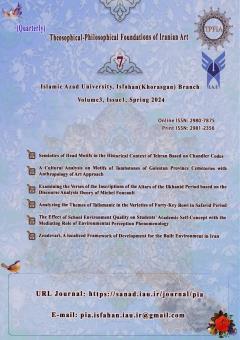Zendevari, A localized Framework of Development for the Built Environment in Iran
Subject Areas : Wisdom and architecture
1 - Assistant Professor, Ardestan Branch, Islamic Azad University, Aredstan, Iran/ Water science research center, Isfahan branch, Islamic azad university, Isfahan, Iran
Keywords: Built Environment, Progress Framework, Sustainable Development, Zendevar Architecture, Zendevar Development,
Abstract :
The most practical development framework, named sustainability, is not completely accepted in Iran. Therefore, it is necessary to localize the paradigm to adapt to national conditions. In this paper, a new framework named "Zendevari" is derived from sustainable development theory through logical argumentation to be practical in the context of Iran. Thus, this study attempts to localize the framework for evaluating sustainable architecture and present an Iranian model and framework. The model is then tested using one of the most valid models for evaluating architectural sustainability as a quantitative model in the field of architecture. Finally, several successes and examples achieved through the framework are mentioned to confirm the testability and strength of the theory. In this study, a new method is employed to reformulate and form a native Iranian Islamic model, Zendevari, for application in the built environment. The steps and processes of achieving the reconstructions and quantitative patterns are described at the end of this study. Lastly, a mixed method and survey Delphi process, including the Friedman test, confirm Zendevari framework indicators in seven variables, positioning the localized theory in first place.
ایروانی، هوتن، (1389)، تدوین معیارهای کیفی پایداری از طریق مقایسه تطبیقی شهرهای زواره ایران و سانتافه(آمریکا)، رساله دکترای تخصصی معماری، دانشگاه آزاداسلامی واحد علوم وتحقیقات تهران.
خسروپناه، عبدالحسین، (1390)، الگوی حکمی-اجتهادی علوم انسانی، جاویدان خرد، 29-66.
طباطبایی، سیدمحمدحسین، (1399)، اصول فلسفه و روش رئالیسم، صدرا، تهران.
کاظمی، سیدعلیاصغر، (1377)، بحران جامعه مدرن، نشرفرهنگ اسلام، تهران.
گروت، لیندا و وانگ، دیوید، (1401)، روشهای تحقیق درمعماری، ترجمۀ علیرضا عینیفر، دانشگاه تهران، تهران.
متحد، ملل، توسعۀ پایدار، بازیابی از سازمان ملل متحد: http://www.sustainabledevelopment.un.org،8/6/1399.
مصلح، علی اصغر، (1392) ادراکات اعتباری علامه طباطبایی وفلسفه فرهنگ، موسسۀ فرهنگی هنری پگاه روزگارنو، تهران.
Basden, A (1998, May 8), Summary of Dooyeweerd's Cosmonomic Philosophy , Retrieved january 16, 2009, from Dooyeweerd Pages: http://www.dooy.salford.ac.uk/summary.html
Brandon, P. S., & Lombardi, P (2011), Evaluating Sustainable Development In The Built Environment, Blackwell, Oxford.
Campbell, S (1996), Green Cities, Growing Cities, Just cities? Urban planning and the contradictions of sustaunable development, APA Journal, 62(3)(summer), 296-311,468.
Carter, R, Martin, J, Mayblin, B, & Munday, M (1984), Systems, Management and Change, Harper & Row Ltd, Open University.
Iravani, H, & Etessam, I (2009), Role of Wind and Natural Ventilation in the Vernacular Architecture of Zavareh, International Journal of Ventilation (ISI), 175-186.
Iravani, H, & Mofidi Sh, S.M (2008), Role of Wind in Vernacular Architecture of Zavareh, Varoius Ventilation Types. Renewable Energy and Environment for Sustainable Architecture (pp. 523-530), Narosa, Delhi.
Iravani, H, Salehi, F., Zamani, N, & Hashemi, E (2018), An Evaluation of Zendeveri (Lifelikeness) in the Architecture of Imam Jome’eh House in Isfahan, International Journal of Architecture and Urban Development, 49-60.
Moore, G (1991), Linking Environment-Behaviour and Design Theories: Framing the Deabate, EDRA, Mexico.
Santa Fe City Code (1997), Retrieved January 10, 2009, from The Official Website of Santa Fe, New Mexico: Sustainable Development Indicators, (1994, JANUARY 20). Retrieved 2010, from WWW.UNHABITAT.ORG.
U.N. (1996), Indicators of Sustainable Development: Framework and Methodologies, U.N., New York.
U.N. (2007), Indicators of Sustainable Development, United Nations Publication, New York.
United States Green Building Code (2009), Retrieved MAY 12, 2009, from LEED: http://www.usgbc.org/store/ publicationslist_new.aspx?CMSpageID=1518
Waddington, C (1942), Canalization of development and the inheritance of acquired characters, Nature , 150 (3811):563–565.
WCED, B. C. (1987), Our Common Future, United Nation, New York.

